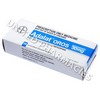Customers also like
Adalat (Nifedipine) - 10mg (60 Tablets)
from only £36.79
Adalat OROS (Nifedipine) - 30mg (30 Tablets)
from only £23.19
Nicardia Retard (Nifedipine IP) - 10mg (15 Tablets)
from only £1.54
Nilol (Nifedipine/Atenolol) - 20mg/50mg (10 Tablets)
from only £2.14
MYONIT INSTA (Glyceryl Trinitrate) - 0.5mg (30 Tablets)
from only £3.37
Description
| Main Use | Active Ingredient | Marketed Name |
| High blood pressure treatment | Nifedipine | Adalat |
Uses
Adalat (Nifedipine) is a type of pharmacological agent called a calcium channel blocker. It works by relaxing and dilating the arteries so as to lower high blood pressure. Contraction of the blood vessels contributes to high blood pressure. This medication acts as a calcium antagonist and works by bringing about a decrease in the transmembranal influx of the calcium ions into the cells via the calcium channel.
As a result of this, the muscle cells are denied calcium, and this causes the coronary arteries to relax and dilate. Vasospasm is also prevented, and the overall result of this is that the poststenotic blood flow and oxygen supply are increased, and peripheral resistance of the arteries is lowered. Lowering of blood pressure can then occur. In addition to hypertension, this medication is also used for the treatment of angina and coronary heart disease. Medical researchers have even studied its potential effects if used for Raynaud's phenomenon.
Dosage and Administration
Adalat (Nifedipine) is provided as 20mg strength film coated tablets, and administration is by means of the oral route. Your doctor will assess your symptoms, and individualise the dosage based on how severe the condition is. The clinical response to treatment will also be taken into account. In general, the dosage will need to be started low and gradually increased.
Adults treating hypertension or angina may be directed to start out with a single 10mg tablet taken twice per day. The doctor may decide to adjust this dosage and direct the patient to administer one 20mg tablet twice each day. Patients are usually told to take them 12 hours apart. As the dosage will vary for each individual, it is necessary to follow the instructions of your doctor at all times.
Side effects
Patients undergoing treatment with Adalat (Nifedipine) may suffer from side effects, including:
- Cough
- Slight vertigo
- Changes in mood
- Nasal congestion
- Muscular soreness
It is necessary to report all side effects to your doctor. Certain reactions may be of a serious nature, and this will require you to seek medical treatment straight away. Examples can include inflammation noticeable in the feet or ankles, a worsening of angina symptoms, soreness in the stomach and other serious adverse reactions that are not mentioned here.
Precautions
Do not consume grapefruit juice or grapefruit, as it could interact with the medicine and trigger elevations in the plasma levels of the medicine.
Regularly visit your doctor so that your blood pressure can be checked and any other necessary medical tests carried out.
Seek immediate emergency medical attention if you suffer an allergic reaction. Symptoms to watch for, which may be indicative of a reaction, include skin rashes, hives, swelling of the face or limbs, trouble breathing, and trouble swallowing.
Always use Adalat (Nifedipine) as you have been prescribed by your doctor. Never self-medicate or change your dosage without first consulting your doctor. The correct dosage can vary depending on your health, medical history, and the severity of the condition being treated.
This medication may not be safe for all patients. Before you begin using it always disclose the following to your doctor:
- If you are pregnant or breastfeeding.
- If you suffer from any allergies.
- If you suffer from any other health conditions or illnesses.
- If you are using any other medicine (including all non-prescription).
- If you are using any supplements, vitamins, or herbal products of any kind.


-Tab-20mg-UK-1.jpg)
-Tab-10mg-UK-1s.jpg)

-Tab-10mg-UK-2s.jpg)
-Tab-20mg-50mg-UK-1s.jpg)
-0.5mg-UK-1s.jpg)
-Tab-20mg-UK-1s.jpg)


